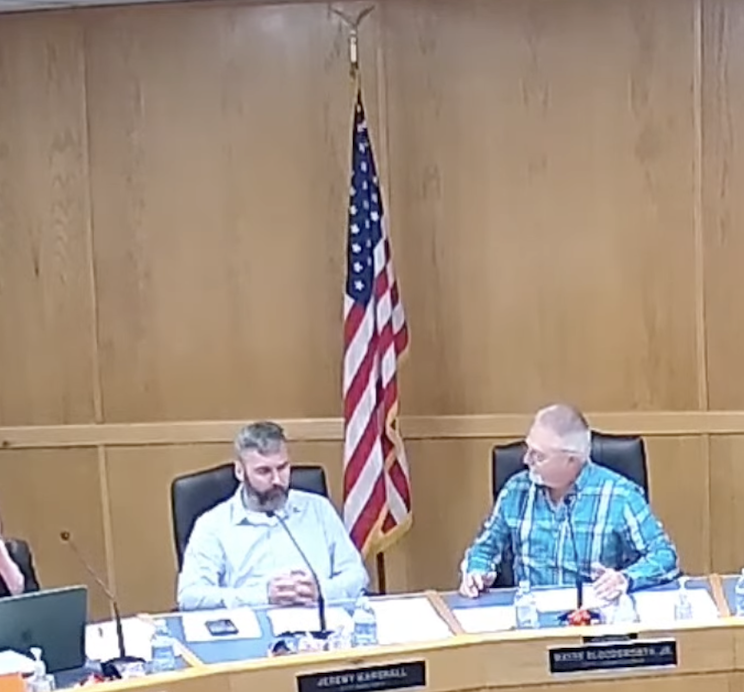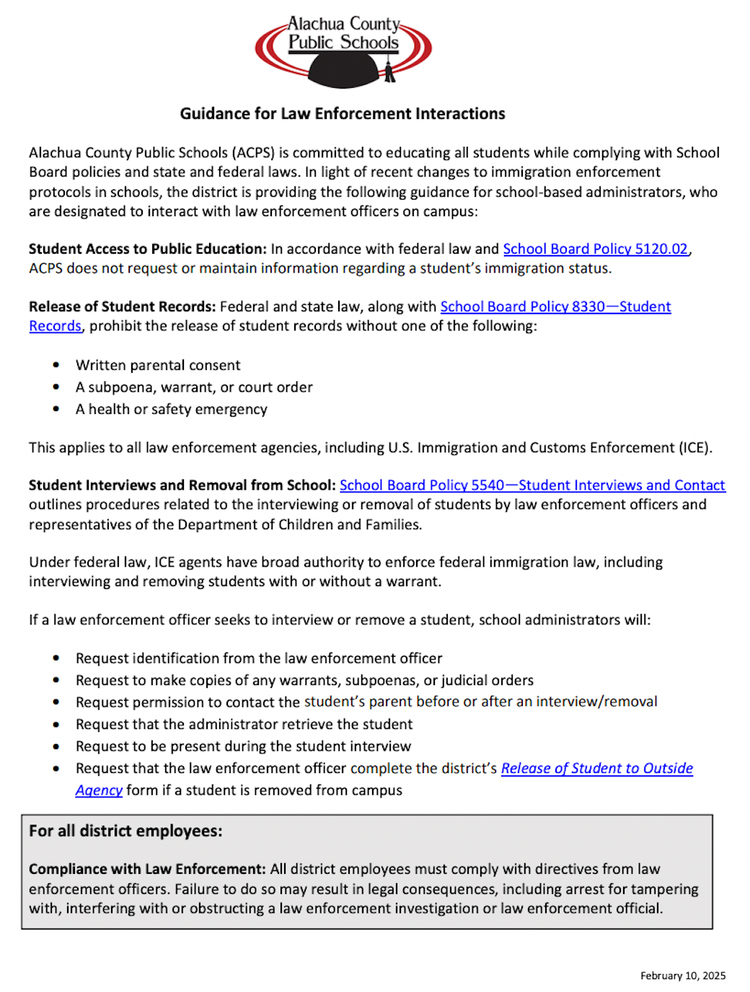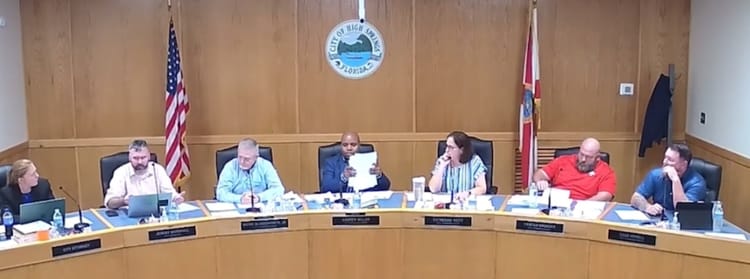City Officials Address Easter Shooting at General Policy Meeting

Editor's Notes: Since this meeting was conducted one of the shooting victims, Ontaria Baisden, succumbed to a gunshot wound in the hospital.
At the General Policy meeting Thursday, city leaders addressed the shooting that occurred on Easter at TB McPherson Park, leaving three people injured with gunshot wounds. The following is a transcript of the meeting:
Mayor Harvey Ward: Welcome to this general policy committee meeting of the Gainesville City Commission for Thursday, April 24, 2025. Madam Clerk.
Clerk Kristen Bryant: Mr. Mayor, we have the adoption of the agenda.
Mayor Harvey Ward: Before we get a motion for that, let me say that we changed up the agenda, as is very obvious, because there's an item that we wanna talk about and follow up on and recap from this past weekend, and we did not want to, in any way, dishonor anything that happened—you know—to the folks who were affected this past weekend by talking about something more celebratory, which the economic development discussion certainly is.
We're in the process of looking for a day for a special meeting specifically to talk about economic development. That has not gone away, and there were no balls dropped on that end, but that's why we're in the position that we are today, just to be respectful and to honor anyone who's affected by the events of this past Sunday.
Commissioner Ed Book: I think it was a wise move. Mr. Mayor, we can't be talking about economic development and that framework when we had such a significant incident on the weekend. I'm glad we made that change. We very rarely do something at the last moment, but it's important….
City Manager Cynthia Curry: On Sunday, April 20, there was an incident, a very serious one, a tragic one, at TB McPherson Park. As you all know, TB McPherson Park is a critical asset in the community. We have had a lot of discussion around TB McPherson Park in the three and a half years that I've been here at the city.
Before I go into any litany of events, [I want to] just extend my heartfelt sadness to the family of Ontaria Baisden. She is the young lady, 20 years old, that was shot on Sunday; very serious injury. She's hanging on to life. Her cousin Malcolm was also injured, along with a third person. I want to make sure first and foremost that we extend our concern for the family and the situation that they're going through.
On Sunday, the event was held at TB. The application for a special event was filed with the Gainesville Police Department. That application was to host what was tagged as an ‘Easter egg hunt for family and friends, accommodating approximately 400 people, requiring about 10 off-duty security officers, and a request for four officers from GPD to supplement that for this event.
There was a concern raised that there was not adequate parking to host an event of such, and a request apparently was made, I'm assuming, by the organizers to the church down the street to allow them to utilize parking, and apparently, that request was granted.
The event started around noontime, and I think it was to end somewhere around 4:00 or 5:00 p.m. The initial request was for the event to last until 8 p.m., but that request was denied. My concern around the event is that in April of 2023, in fact, specifically April 5, I advised this commission that after a lot of discussion with the police department, with the parks and recreation department, and with many of you, because of the twenty-year length of activity with an event called ‘Peaceful Sundays’ that was held at TB, it was time for that community to be given a rest or reprieve from the crowds, from the music, and from the activity. The parking was out of control, and the event—not casting any dispersion on the event, people have fun in different ways—but the park, they had outgrown that venue and needed to seek another venue. We had offered another venue, which they did not want to utilize. It got to a point in those discussions where we, the city, had to actually close TB for a couple of Saturdays or Sundays or weekends just to kind of make sure that we were sending the message that we, the city, were serious about trying to protect the interest, right, of the community that this event was being held in.
Community takes on a lot of different connotations. Having an event for the benefit of the community, in the case of past events, has been regional in nature. The community has been a regional draw of people coming to the event, with crowds exceeding somewhere around 2,000.
This past weekend, the application that was filed with GPD came in and was reviewed by GPD staff, and it was routed to other city departments, parks, and fire rescue for them to review as well. My disappointment in what occurred was that I, the person who took the lead, working with you as a commission and the same departments to cease the activity of that kind of volume of activity at TB, was never brought into the information loop.
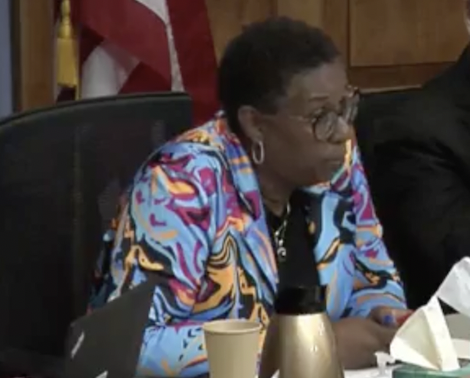
I've spoken to the departments; I had a meeting this morning. The concern was that the process may need to be revised, and maybe so. But from my perspective, based on the history of what we have dealt with for many, many years, it quite frankly just took common sense and not a check of a box on a form to say, Let's stop and think about this and what it means. I never got that opportunity to do that, and I am very disappointed. I am very dismayed, and I am very saddened based on what finally resulted. I realized that the shooting took place down the street and it was not in the park, but the people were there to attend an event in the park. And so it was still, in my opinion, tied to the event that should not have occurred.
I have met with the police chief and many of the staff folk involved. I have made it very clear about how I feel about what occurred because I feel like not only have I been let down, and I say that because the city manager, I am the one taking the lead based on your support to make sure that we gave that community what it deserved on Sundays with some peace. I felt disappointed. I believe that the city has been let down in a way, and I'm not hiding it. I'm not trying to sugarcoat it. I'm just being very upfront. I don't believe that this would have occurred if we had denied the permit. If I had been given the information that they had, I would have denied the permit and taken whatever came from that. At this point, after speaking with the chief this morning, we had the meeting. I spoke to him post-meeting. I have every intention of addressing some disciplinary issues in this. I'm not prepared to say at this point what they are, but I will be dealing with some disciplinary issues as they relate to this event. Quick, fast, and in a hurry. I'm very sorry to have to be this blunt and transparent. As we all say, we're transparent. This is as transparent as I can get….
Commissioner Cynthia Chestnut: Madam Manager, thank you for that update. Perhaps someone on your staff can answer this. Were there two special events approved as an Easter egg hunt? I believe there was one event on Saturday that was an Easter egg hunt at McPherson.
City Manager Cynthia Curry: Mhmm.
Commissioner Cynthia Chestnut: This event was also an Easter egg hunt, so there were two Easter egg hunts approved?
City Manager Cynthia Curry: There was an Easter egg hunt, I believe, on Saturday, a very different nature of an Easter egg hunt…. Then this was tagged or themed as an Easter egg hunt on Sunday at TB McPherson for families and for kids and families….
Mayor Harvey Ward: Does anyone from the public want to speak on this item? Don't feel compelled to, but if you'd like to, the opportunity is here.
Vanessa Henry: I am a resident of Gainesville, Florida. I have been the majority of my life. It breaks my heart, but I'm here [for] a couple of reasons. As a parent. I want to be clear about something. There were two events. They were focused on the children.
The one Saturday was for the children. Each year, this gathering happens each year after the Easter event. Let's be clear. The guy that put on this event for our children stepped out and followed protocol, doing everything that he possibly could to ensure that with everything going on financially, our children in our poverty-stricken areas were given baskets, candy, eggs, the works. He and his team went above and beyond.
The tragedy took place after the closing of his event; everything was shut down. I've witnessed it for the past five-plus years after the closing of TB. It's the gathering outside of the gates. The gates are closed. Everybody's gone. It's the massive gathering outside that we can't control, and it has to stop. There is no—you don't have enough police in our community to police that area on Easter. Why do we choose God's resurrection day? It's beneath me.... It really is sad that the day that we go out with our children and families is a day that they choose for the end.
The good have to suffer with the bad, but 2,000+ people are just standing inside the road. I was young at some point. I rode through at some point. I rode through Sunday before dark, but just to see. The children out there—you know—putting them in harm's way while we're just sitting on cars and just listening to music, the noise, it has to stop. This has continued year after year after year, and there's no point behind it—the crowd goes from there to a store, McDonald's, Wawa. It took me 30 minutes to get from McDonald's back to my house off 15th Street. The cars are blocked. There's one police officer at the store. He can't do it all while there's a real crime committed somewhere else. He's watching to make sure that somebody walks across the street safely, you know, 300 people at one time. They can't; you can't do it all. You can't.
So the event—it wasn't at the event. The event was for the children. It shut down at the proper time. Clean up, great. Everybody locked the gates; let's go. It's outside the gate when it's time to go home. Those people weren't even at the event, the majority of them. They were just there, and they come every year. That's what has to stop. It's a different type of behavior. You can't monitor guns. You know that guns are out of control. We don't know what happened, but it happened in our city, and it has to stop. So as a community leader, I have to be here to make sure that my voice and I do my part in ensuring that it doesn't happen again at any event. If it's shutting everything down, I'm for it. I'm for it to save lives. I am because this could have very well been very tragic. And thank you for everything that you all are doing. And to those two people in that video that shielded that child, thank you. I commend them.
Mayor Harvey Ward: Anyone else want to make a comment?
Alachua County NAACP President Evelyn Foxx: I too am saddened by what happened on Sunday. From talking to people in the community, the young people just want some place to go. It is unfortunate what happened on Sunday, but I don't think anybody is to blame. I was saddened that it happened in front of a church. I don't know how we can control the crowd, madam manager. I don't know how we can do that. Most times, the people that are there are not even from Gainesville; they come from outside of our city, and it's just a place to go. Now I went on Saturday and took my two great-grandchildren to the Easter egg hunt. It was wonderful, and the kids and the parents so enjoyed it. Nothing happened. It was just a fun morning for them. Sunday, it just got a little out of control from people outside. From what I can understand, there are people outside of our city.
The young people in Gainesville, they do want something to do. They want a place to go. But if it's not safe for our community, then perhaps we need to look at something else. Maybe go to the MLK Citizens Field or somewhere that's enclosed where we have a little bit more control over what's going on. I think the TB McPherson Center is not the place for an Easter egg hunt or anything when we are going to have more than 2,000 people there. It's just too dangerous for our community. I think it's just too dangerous. Thanks to the policemen and the fire rescue and everything else that came out on Sunday to help to save the people's lives that were injured. I don't think anybody is to blame. It was unfortunate. We just have to move forward and come up with some better ideas on what we can do to have entertainment for our young people.
Commissioner Desmond Duncan-Walker: First, to the family of Ontaria Baisden. I don't think there is a person at this dais or across the city who does not stand in deepest sympathy with you. From my mouth to your ear, I do want you to hear that we are incredibly standing in our deepest condolences with you at this very difficult time.
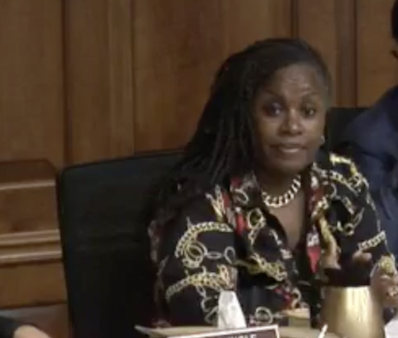
Manager Curry, thank you for your transparency. I think that that is what we need in moments like this. We need it not just as a commission, but we need it as a community because it is informative to us to not just A. hear that there was an issue, but B. to hear that you are working to resolve it. So thank you very much for that. I do have a question because it sounds like there was a permit that had a request of 400 people. Am I correct?
City Manager Cynthia Curry: Yes.
Commissioner Desmond Duncan-Walker: But in the park, I heard, and I was not there. In the park, there were 2,000 people. We have a very capable and, I think, trained police department and other staff in event management. What mechanisms are in place? What did we miss? How do we control the crowd? Because that is a massive difference, right? Between 400 people and 2,000. T. B. McPherson is not big yet; we know it's a draw. This is not the first time we've heard of thousands of people descending upon TB McPherson. What was supposed to happen to control the crowd that did not?
City Manager Cynthia Curry: May I respond?
Commissioner Desmond Duncan-Walker: Please.
City Manager Cynthia Curry: I'm going to start the response off, and then I'm going to kick it over to the chief. I don't know that there were 2,000 people inside TB. I don't know that. I know that there may have been approximately 2,000 in TB and in the surrounding area of TB down the street. That may have been 2,000. But in the park, maybe not. I do know that the park's parking is limited to 80 and maybe 28 handicapped, but I know that the church has parking. I only know this because I've dug into it post-event. There was not enough parking even though they got parking down the street at the church. All of that fed into the event. The event at TB is not just inside the park. It's outside the park in the cars with the radios. It's just a community-wide thing. It's not just in the park. My concern and conversation too with the department; with GPD, is just that. If you have an application that says 400 and you realize that in and out of the park is 2,000, it's time to shut it down, plain and simple, or have a plan in place to manage it. When Peaceful Sunday was going on years past, I went out for a couple of years before it was shut down, and it was shut down for one year. We did get one year's worth of reprieve out of the ceasing of activity around Peaceful Sunday.
My concern is once you get an overload of patrons in and around the park, unless we're pulling in the entire police department, which, quite frankly, a couple of years ago, half the police department was over in TB trying to manage that crowd. I'm not over-exaggerating.... The event was bigger than any of them could manage at that point in time. My concern and my conversation are, once you see that the event is not 400, but some other amount, and not just in the parking around it because we're concerned about safety all around, not just in the park, but up and down the street and around. You shut it down. Unfortunately, you send the right message out, and you have to ask people to leave. That didn't occur. I think it started to occur towards the end of the event when they were trying to extend the time to go to 8:00, and it was time for them to shut it down. If I'm saying something incorrectly here, chief, I am open to you all coming up and correcting me, but I've gotten so involved in this that I just almost feel like I'm living it. As it got closer to the time for it to end, the organizers were asking for an extension, and the extension was denied by the police department. But at that time, I think the crowd was bigger than they could manage. There lies the other problem.
Commissioner Desmond Duncan-Walker: Thank you very much for that, manager. I have been fielding a host of calls from constituents and concerned people all around the city, but namely from the Lincoln Estates area. As we all know, for years people have come from both sides of this conversation about the events at TB. Individuals have come saying we've been hosting an event that is for this particular group of people. It has been peaceful inside of the event, yet there were community members who also came to this commission stating, "It's not peaceful on the outside." Our concerns for public safety have been voiced from this dais on numerous occasions. Clearly, the ability of public safety to be able to traverse down 15th Street to get not just to what could happen in the park but to be able to get to our neighbors who live in the surrounding area was a huge concern of mine because it also came to me that there were cars that were parked for, was it, half a mile down the street in both directions?
City Manager Cynthia Curry: It's been that way for 20 years.
Commissioner Desmond Duncan-Walker: Right. So what the plan is, is critical….
City Manager Cynthia Curry: Two years ago, we had a very deep discussion with the community as well as here at the desk and with staff. And the decision was, and I have the memorandum that I sent to the commission on April 5, 2023, which outlines the concerns that were had with the event and how the spillover effect of it in the community was causing issues, the after-parties or pop-up parties that you referred to at the bars or the Wawa and whatever. They were causing us serious concern about gun violence and the whole—you know—issue around that…. We ended up deciding that the park TB was not a venue that could accommodate huge crowds like that. We said we would no longer have it. We offered another option which was Cone Park. No one wanted to entertain that from the organizer's standpoint, so we moved beyond it. Last year, which is '24, was the first year that we did not have a Peaceful Sunday February through August....
It is not so much what happens in there as much as it is what happens when you Facebook it out and you advertise it. I've had a little flyer in here, and now people are showing up on Saturday to reserve their parking space because they know there won't be any spaces. That's what we have. I'm just, again, disappointed. I'm dismayed, and I've shared the extent of my disappointment with staff. As far as I'm concerned, the way you stop it is when the permitting process kicks in again, if we need to make tweaks to it. Like I said, I don't think there is any excuse for having to rely on an application with some boxes to check when common sense ought to kick in. But if we need to revise the process so that it's clear that if there is an event over 400 or whatever it is—you can't accommodate it because of the parking
If it clearly is out of control because you don't have 400 and you have 2,000 in the surrounding community, you shut it down early enough before it starts to morph into something else. So what are we going to do about it? I'm going to deal with some disciplinary actions first. And then secondly, we're going to modify the process so that, hopefully you can just look at a box and check it, which in my opinion is okay. I don't think that at the senior level that is the requirement. You would expect somebody to have discernment and discretion and a reference to history since it has spanned over 20 years as to what has occurred in that neighborhood.... Over that 20-year period, I don't recall any shootings. Nothing like that was brought to my attention. It was just the crowds, the noise, and the community suffering from the parking and the lack of access down 15th Street. And of course, emergency access if something needed to happen. So we did. We checked it last year. Here in '25, it morphs again, unfortunately, under the guise of an Easter egg hunt, which again, I'm sure that there were some folks who had a little fun there. But TB on Easter Sunday, with that kind of advertisement around the event, created what we have, and it ended in tragedy.
Commissioner Desmond Duncan-Walker: Thank you for the permitting piece because, as much as it could be a common sense matter, I think you have to put it in black and white and on paper. Make it very clear to staff that this is the process. This is the policy that must be adhered to from this point because I think that is where the initial breakdown began.
I want to fast forward now to the community side of this because it's not lost on me that folks desire a place to go. I think the thing is, what we've said from this dais is the city does not have a park that is large enough to accommodate 2,000 people. When I hear individuals come and say, well, "Where can we go?" Well, first, let me say this because someone said this to me yesterday, and it kind of made me jolt a bit. "Well, we can't go to this park." You can go to every park. You can go to every single park in this city. The parks are yours. The issue becomes the size of crowds and being able to keep people safe. The city does not have a space that can accommodate 2,000 people right now. As I talk to community partners, community leaders, etc, that's been one of the things. "Well, where can folks go?"
One of the suggestions that was made isn't even directly in Gainesville proper, but I do want to say it from this dais because I think it bears saying because folks deserve to be able to gather. People don't have to agree with the way folks do it, but as long as you do it safely, you deserve to be able to gather.
Gator Nationals was a part of a conversation. It is not a city facility. There may be a fee that is involved with going out there, but perhaps that is something that folks who want to do something on a large scale may want to consider. I have no idea; I have not looked into it myself what the requirements are to go there. However, it is a massive space. It is a racetrack that is built for loud scenarios and probably far enough away from neighborhoods that neighborhoods wouldn't feel the type of impact that inner-city neighborhoods feel when thousands of people descend on a smaller neighborhood park.
I don't know right now where the compromise is in this. I simply know that we have to always keep people safe. We have to improve processes where we can so that we are able to do that on the front end, making sure that we control crowds. If there is a way that we can help our neighbors find ways to do things that are constructive and recreational for them, then that's great as well. But I think right now, obviously, as we've said over and over again, we don't have the space for 2,000. We've got to make sure we don't overcrowd our parks, that we keep roadways clear, and that the institutional knowledge that exists around our events comes into play when we receive these types of requests….
Commissioner Ed Book: I feel some of the same things that you've been talking about. The manner in which you make sure an event is safe is preeminent. There may be a process question here, but this is more of an operational issue. There is an overlay in your responsibility. Normally, I like to say something and get a question. But this is probably going to sound more lecture-like. I just have so many things that are really concerning me about this event. It was dubbed Peaceful Sundays for years, and it was anything but peaceful most of those Sundays. Often there was violence. That's a fact. That's factual. I know because I spent many Sunday nights out there.
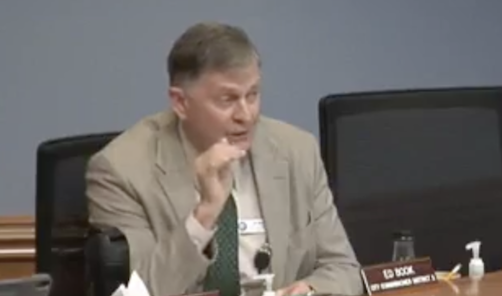
It's pretty important to know that I feel like ultimately the responsibility lies here with the shooters. Right? That's the ultimate responsibility. The people who bring guns to an Easter egg hunt that's classified as an adult Easter egg hunt on a Sunday, which I think you were kind of alluding to, Commissioner Chestnut, it makes no sense to me. The Easter egg hunt I'm aware of typically focuses on youth in the daytime at churches, communities, and parks; this event is not that. That title, "Easter Egg Hunt at Night," to me, automatically indicates there's an issue. Right? For adults? I don't think so. But the ultimate responsibility does lie with the shooters. I think my one question is, if we have the capability—Madam Manager, I really do appreciate your candor and bluntness. Are we able to get an update at this moment about that piece? Any update that would be publicly accessible on what we're doing on that side to shooters who should be identified and arrested and go to prison….
City Manager Cynthia Curry: I don't know that there's been any progress on identifying the shooters.
Gainesville Police Department Chief Nelson Moya: At the moment our number one priority is the resolution in this case. We have, as you can imagine, a tremendous amount of narrative leads that we are receiving and that we're sifting through. As you also know, when we have an event of this magnitude, often the facts are very distorted, and we have to take a lot of investigative time and effort to sort through that and identify those who are truly witnesses that can grant us what we need to lead to an arrest, which is our ultimate goal. Bear with me as I'm holding some cards close to the vest so as to not divulge investigatory steps, but we are moving forward and making progress on a tip-by-tip basis. My expectation and hope and prayer is that we will bring this resolution shortly back to you all in the community as well. And certainly, Miss Baisden's family, because she's really the epicenter of this. I would trade in any of this discussion for her well-being today. Now, Madam Manager, if you would care for me to address everything else, I'll provide a narrative.
Commissioner Ed Book: Let me, let me just intercede there for a minute, chief…. I wasn't looking for specific things that would compromise the investigation. [I wanted to see that] we're just moving forward. We're following up the leads. We feel like we're moving in a direction that provides resolution for the folks who caused the violence. That's really what I was looking for. It sounds like you got that.
The other overlying area of responsibility is the organizers. People who organize an event and put together paper and put their names on it are also wholly sharing accountability and responsibility for what they do at that event. If they say 400 are showing up and 2,000 are showing up, they bear responsibility for dealing with some of the management of an event at a venue. Period. Outside, inside, it's all one event. I think when we try and say, well, “it's pre-event, it's post-event, the park is closed.” It's all part of one event that came to us. We have to treat it in event management operationally as one large event. It's not over until everybody's gone. That's when the event's over. Otherwise, it is part of, in this case, this ill-titled Peaceful Sunday event. The organizers here are known. We have institutional knowledge that there were many non-peaceful Sundays under their leadership, and this was another one. So they do bear quite a bit of responsibility and accountability for control, signage, understanding interruptions, and knowing the people coming. When they indicate it's a community event, my question is always, what community? Because the five neighborhoods, and I'm not going to mention them just out of respect for the neighborhoods—I know you mentioned one, Commissioner Duncan Walker.
It's my impression, and so if somebody disagrees or knows more about most of those communities—most of the people in those neighborhoods directly adjacent to the Peaceful Sunday events do not support that event. Period. That's factually correct also over the years because they've been impacted by the noise and the trash and the alcohol and the traffic and violence right there. The neighborhood is right next to 15th Street. The churches too, because they can't even get through. I think it'd be a terrible thing if we did have an emergency response and they couldn't get through because we have an event that we let get too large, that was no longer confined in a park, and we shouldn't have cars in a right-of-way. They wouldn't be there at any other park. The organizers bear quite a bit of overlaying accountability.
Then we know, you've talked about it Madam Manager, so do we. We're the third layer. We're the event managers; we're the operators. We're the people that set the tone, enforce the things we need to, make sure cars don't get over occupancy, and deal with stuff on the front end so we're not talking about the end game; we're talking about here. It's really concerning. I feel like probably everybody else out here—to the family and the people who are being impacted, either direct family members or friends or even all those who had to basically deal with the aftermath of a shooting when you're in an event and you think it's safe—that's a major impact on a lot of people, so I feel sorry. I really do apologize for that too. You know, maybe we refine a permitting process, but this is bigger than a permitting process, the situation there. We've made so many gains on the gun violence side in the last two years. We have. Statistically, it's been unbelievable. I know, Commissioner Duncan Walker and Mayor, you started and we get this resolution. We can point to everything we've done, and it's been positive. Really, look at the numbers; look at the people hurt. Boy, we've had an awful last month and a half in the city and county. We've had people who've lost their lives in both the city and the county, and we can't take another two steps back.
Commissioner Casey Willits: Chief, I had a question. The permit was through GPD, right? It wasn't through parks, like special events. The organizers started with GPD?
City Manager Cynthia Curry: Yes. The special events process starts with GPD. They coordinate it.
Commissioner Casey Willits: It sounds like the organizers did far more of what the commission discussed in 2023. I don't know if we directed the city manager to adopt more, but we voiced this idea that events need to go through a process and permit so that if it's a business venture, we don't give away our parks' referral for business ventures. You have whatever it is you have to pay for: permits, arrangements, security, trash, all that kind of stuff. That was part of the problems of previous Peaceful Sundays.
City Manager Cynthia Curry: Just to be specific. Several years or so ago, the process was actually centered in the parks department. Because we were having these discussions about how we might rein it in better, we had a staff person literally working this process and trying to retool it so we could get a better flow of how decisions were made, which created GPD as the originating point of submitting your application, having it reviewed, working with Parks, DSD, Transportation.... Fire and Rescue. But, yes, we retooled it so that it started in the police department for special events because that's where you need to have the focus.
Commissioner Casey Willits: I just saw some of what got communicated get put into practice. It sounds like the organizers went through far more of what we wanted, but they originally requested to go all the way until 8 p.m., and they were turned down?
City Manager Cynthia Curry: Am I correct?
Gainesville Police Department Chief Nelson Moya: Correct. The permit called for the end of the event at 7 p.m. On the scene that night, on-site, on or about 7 p.m., they made a request of our staff to extend it to 8 p.m. That request was denied. It was denied for a couple of reasons. Number one, because the permit was very clear. And number two, because at 7 p.m., we began to see the influx of people trying to get into the park. We knew that we had to end it.
Commissioner Casey Willits: I saw a social media post that suggested that it was planned until 8:00. I'm not making it up. I saw a social media post that planned it until 8:00. I'm confused because, you know, they planned it till 8:00, and just to be clear, the shooting happened at 8:17?
Gainesville Police Department Chief Nelson Moya: Yes, sir.
Commissioner Casey Willits: That's shortly after, outside of the park, by First Missionary Baptist.
City Manager Cynthia Curry: I don't mean to interrupt you, Commissioner, but I want to make sure we get all the points in here. It was originally requested for 8:00, and I think staff rolled it back. The flyer that I saw that was pulled off of Facebook had 8:00 on it.
Commissioner Casey Willits: I understand there's confusion. You do all your work, and then your permit doesn't go through, and you still use your original graphic. But that's one of the issues: the organizer did far more of what we wanted to pull off a normal event in the park. But they have to know—a club promoter has to know that 400 was going to be surpassed. They're a club promoter. They know what they're doing. They reached out, and the after-party was called for an all-call from Lakeland, Jacksonville. It was a come-to-town after-party that started at 10 p.m., but we're going to end at 8 p.m. at a park. You know? There are two hours there. If you don't live here, what are you going to do? You're going to hang around. If you live here, you go home and, I don't know, get a shower or eat dinner. But it sounds like they really did what they wanted. They were closer to what we wanted, but then 400 wasn't realistic.
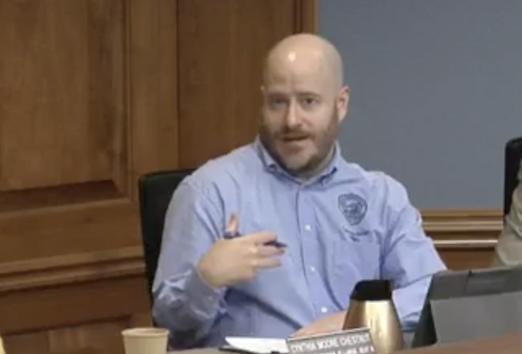
Madam Manager, thank you for the transparency that we probably know better. That it's been a huge success in the past. You don't get rid of that history or that kind of thing that happens in our community. People remember, and they—you know—despite what it says on the one flyer that gets spread on social media, they go, “Oh, it's back….” I want to have these kinds of great opportunities for people to use parks. Commission Duncker Walker, we have parks that can handle 2,000 that cost money. Because we don't give you Depot Park for a 2,000-person event without—you've got this, this, this, this. If we can do a medieval fair there, we can have a 2,000-person event. The parking is scattered everywhere. People can complain about it, but it works…. I hear we don't have our festival park. Old fairgrounds would have been sufficient. New fairgrounds, probably sufficient. GatorNationals is sufficient. Cuscowilla is probably not big enough. We have a couple, but that's just a different kind of—it's far less than you're kind of full festival. You have to go through all the steps. It gets real pricey to pull off anything that big. I'm trying to think of what we have in town that's kind of in that size range that isn't a street festival. You know, an arts festival where we close down an entire street. Parking happens everywhere, but, you know, it works. We have a couple of spaces, but the Depot Park is big and formal. I don't even know if on Easter Sunday we offer that opportunity. But in general, Madam Manager, what do we do for things that happen on holidays, parks? Are all parks open to be reserved on holidays?
City Manager Cynthia Curry: I'll ask the parks director to come up and be specific about answering your question.
Parks, Recreation, and Cultural Affairs Director Roxy Gonzalez: Yes. Our parks are open. They're all on a first-come, first-served basis [and] close them pretty much from sunrise to sunset, our nature parks specifically. Our active parks pretty much go from sunrise until sunset unless rented or reserved for the lighting at the ball fields. On holidays per se, we force anybody that's going to do any rental at our parks that exceeds 20 people or 50 people to go through the special event permit process. So that we can get GDP, GFR, Public Works, Transportation, and Building and Code all tied into the process to make sure that if there are any discrepancies or anything that they can't sustain as well, then we can eliminate that event. We can say that we can't do it or sustain it.
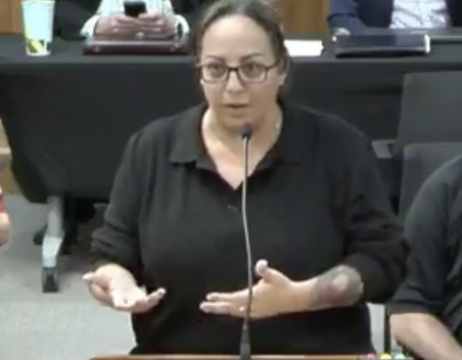
The majority of the events that occur in the parks are more so like birthday parties, or you have an occasional egg hunt. We had various egg hunts throughout the city that day that people went to and wanted to go through the reservation. There were smaller numbers. They also know it's first come, first served. So they ask the questions when they realize, "Oh, there are fees attached to it. We're just going to do something smaller and do it somewhere else.” There is constant communication about that. But, yes, it is able to be reserved, all pending on those limitations on staffing and all that as well.
Commissioner Casey Willits: We talked about two years ago just something that got bigger and more successful than one park can handle, that size park. We could buy extra land around it and just build lots of parking and lots of extra space. I don't know that that's, you know, first on our priorities, though. We have very few, Commissioner Duncan Walker. Right? We have, in essence, very few spaces that are adequate. It's maybe per not half, perhaps in the neighborhood. Right? Because it's kind of a half neighborhood event in Southwest Gainesville, but then obviously half an all-call for people who've never been to Peaceful Sundays throughout the region. And we love bringing people in. It's just we need them at lots of different places or dispersed or at one big event, you know, one big park to handle it.
I appreciate that the organizers went through the steps that we had laid out, but it sounds like our steps aren't adequate enough to recognize what we think is going to be a problem because we do have institutional knowledge. The same way we have institutional knowledge to know that the Gators are playing in the championship, you know… we know what's going to happen because we remember from years ago. We didn't for sure know that people wanted to do what they wanted to do. But we know it's almost impossible to control, and so we adjust to it. But we knew we were able to put in that much effort.
I feel like what we knew would happen in the championship—just too many people in one place—we knew.... I do feel like there's a bit of a breakdown in city staff to not know that just because someone says they're going to have 400 people or know that it's going to spill over afterwards. If you want to end an event, and if you publicize in the media that it's going to end at 8:00, you're not going to clear out that many people by 8:00.
City Manager Cynthia Curry: If I might respond?
Commissioner Casey Willits: Yes, Madam Manager.
City Manager Cynthia Curry: I don't disagree with you at all. Gator National, the basketball championship, events like that, the football games at the university. We have plans that are put together each time by emergency management. Those plans go through all the necessary departments to make sure everything is in order. Those plans are provided to me so that I can look at those plans and have my thoughts and provide that feedback back to Fire and Rescue. That didn't happen here, and that is a huge concern of mine. It didn't happen. This event was big enough, and there was enough history around this event at that park in that community, for the flag to have been raised on more than a few occasions. Not just in GDP, but in parks and GFR and and and other areas.
Commissioner Casey Willits: Community relations.
City Manager Cynthia Curry: Absolutely. I have an Office of Government Affairs and Community Relations, part of my office. I specifically took a meeting at the police department with the chief, his captains, and lieutenants, and I introduced John Alexander. Phil Mann was with me. We talked about some other issues around homelessness and whatever and talked about the importance of coordinating those events with my office on the community relations side so I would always be on the inside—you know—working with them. I was advised that every police officer is a community relations officer. I'm not putting that statement down, but my point is—you know—you all did appoint me as the city manager. As long as I'm in this role, I'm going to do that. When I feel like I have been kind of slapped in the face, it's probably more transparent than I need to be right now. I'm not going to put up with it.
Commissioner Casey Willits: Well, thank you, um. I just want to end by saying I think the organizers clearly know what they're doing to get a lot of people in one place. They're professionals one way or another. They realized they needed more parking, so they did work with the church this time—you know—good. Smart on them so that we but all those cars parked on the side—it's a safety [issue], you know? If there's one car parked somewhere for a day, it very likely could get towed. But when there are hundreds stretched out for half a mile, we can't go do that—take care of it immediately. And so I know that that's also an overlap of the county. Right? Because at some point, they're in the countryside, not the city.
City Manager Cynthia Curry: We've addressed that in the past with Peaceful Sundays. We actually had no parking signs that we made, and we were putting them up along the areas there. When we communicated with the county because we realized that it was actually their property, not ours, they actually were not supportive of putting those signs up, so we were no longer able to put those signs up in that grassy area on the west side.
Commissioner Casey Willits: I do have one more question. Was the county ever notified through our process of knowing we're going to have an event, 400 people, right on the edge of the city?
City Manager Cynthia Curry: I can't answer that. The police department would have to.
Commissioner Casey Willits: Police or Fire?
City Manager Cynthia Curry: Somebody else would have to answer that for you….
Commissioner James Ingle: I realize how empty it sounds to say thoughts and prayers anymore because it gets repeated so many times. But my sympathies and my condolences go out to the families that were injured, that were traumatized, that were part of this whole disaster. We can do better, and we need to do better.
It sounds like the problem was with this specific event. I don't know if there's a problem with our process. I don't know if there's a problem with the permitting. There are lots of events that go on in Gainesville that bring crowds larger than this. The medieval fair was here a couple weeks ago. My wife and I used to put on a Labor Day festival that drew thousands of people. It sounds a lot like this event was advertised far outside of Gainesville with the idea of it not coming and having an Easter egg hunt. I mean, from everything I've heard, it was advertised as a big party. I don't think event sponsors thought there were only going to be 400 people. It's hard to wrap my head around that they would put that much promotion into 400 people showing up.
It seems to me two things. One, if we've got an event that has repeatedly been trouble and repeatedly has caused these problems, that is not something that the local community looks forward to, that the residents in that area aren't part of, but the residents in that area have to put up with, then we need to look at that event as a specific problem when it comes back around.
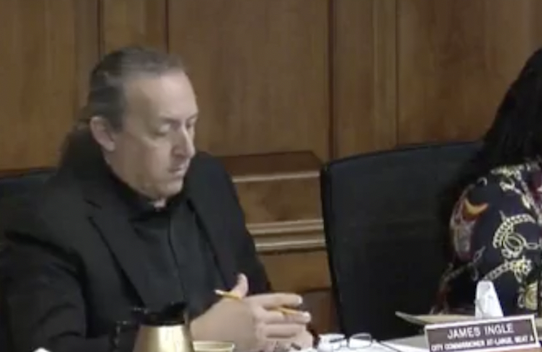
The other thing I'd say is right now, I feel like everyone on this dais is some combination of angry, sad, and disappointed; all of us are a little bit emotional about this. I would also say that when you're in a headspace, making long-term decisions isn't necessarily the best thing to do. What I would really like to do is give us a little time and get some real information back from the police on the investigation and on what happened. In the next few months, once our heads have cooled down a little bit, make some real policy decisions on what we can do to avoid this when we've got bad actors that don't keep everyone else from being able to have a good event. We've got someone who's caused these problems. Let's focus on those problems. Let's keep the neighborhoods that are affected by this whole. Let's make sure the kids can still go on Easter egg hunts without this giant fiasco all around it. That's kind of where I am on this.
Mayor Harvey Ward: I have many, many thoughts, as we all do. I'll try to keep it relatively brief. First of all, let me say that every time we have a conversation about anything that has gone wrong at TB McPherson, there's inevitably somebody saying, "Oh, you can't have anything at TB McPherson. It's a horrible venue for anything." I heard somebody call it cursed. That's ridiculous. TB McPherson is a wonderful venue. We're about to—in the next—some period of time—we have a plan for investing more into TB McPherson. It's a great venue. It's a great park. It's a great community center, but it's limited, as all venues are. You can't put 200,000 people into Ben Hill Griffin Stadium. It's made for about 100,000 people, a little bit less. TB is great for what TB is. The access roads for TB are great for what they are: neighborhood roads. They're not meant to be parking lots. They're not meant to convey thousands of people in and out quickly and in bulk. Southeast 15th St., it's County Road. It's a two-lane road. It's very old. 21st Ave. goes by Evergreen there. That's a city street, but, again, it's a two-lane street. It is not in any way meant to convey large numbers of people in bulk. TB McPherson is a great place for gatherings of, I'm going to guess, more like 200 people or less. I mean, realistically. We had fewer than a hundred parking spaces. That sort of dictates what's possible. There are places where you can have that many parking spaces, but you can creatively figure out where the other people are going to park....
There are no creative ways to access parking that are legal in front of TB. The parking that we have is what we have, and when people start parking on the side of the road, they're inevitably going to be parking on somebody's lawn who did not say, "You can park on my lawn," which was a complaint that we had going back several years. There were people who were selling parking spaces on property that wasn't theirs. Things get out of hand, and we know that things get out of hand at that event. On Sunday afternoon, billed as, you know, whatever it's billed as, wink wink, nudge nudge, and then you see folks on social media from around the state talking about how they're going to get there a couple of days early to park in front of TB. The good news is that we already created the solution two years ago to things getting out of hand at TB. We just didn't use that solution. We have to figure out how to go back and make sure that that solution still works and apply that solution in that space.
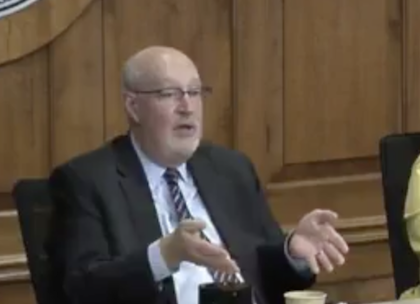
Commissioner Willits, you alluded to a new fairgrounds. When we have the new space for the Hoggetowne Medieval Faire, I think that's going to also serve as a great space for this sort of thing, but it will come at a cost. Any venue has a price. When we have FEST downtown, the folks who do FEST have a cost with it. It is possible to do really creative, really interesting things in lots of spaces around town, but you can't put something that doesn't fit into a space that you just want it to fit. It'd be great if it did, but it's not magic, and it just doesn't work in that spot. Commissioner Duncan Walker, through your leadership and all of us really buckling down and the whole community buckling down, as Commissioner Book mentioned, we've made amazing progress on gun violence. Amazing progress. None of that progress matters when a young person shows up to an event to have some fun and doesn't get to go home ever. I have a 20-year-old daughter. She goes out to have fun. I cannot imagine her never coming home again. But that is what has happened to Ontaria's family. We can't fix that. We can make better choices going forward, and I believe we will. The good news is we have a solution to this very problem, and I'm 100% certain that I said, and probably other people up here said, somebody's going to get shot if we don't do something about the way this happened two years ago. Here we are.
The only other thing I want to say now about this is this young woman is not on life support because she got into a fistfight or because somebody was fighting with her with sticks or swords or rocks or anything else; she was shot. It's a gun problem. With all the other things that it is, it is a gun problem. We can't do anything about that. We can't restrict the supply of firearms or ammunition because the Florida legislature says we can't do that. But it's about time, with all the other headlines we see, not only in Gainesville but around this state, that somebody let local municipalities do something about guns if the legislature isn't going to. All I have to say about it for now….
Gainesville Police Department Chief Nelson Moya: I've stood before you on several occasions over the last year and a half, and we've talked about gun violence and reducing gun-related violence and all of the efforts that have been brought to bear to reduce that metric in our community. Not only GPD and GFR, but all of us, all the directors, and all the community efforts from all respective lanes of intervention and prevention. We all know it.
For this event to happen, it causes me great distress, beyond words. But having said that, when I look at our organization. I'm responsible for the processes. Nobody else. Ultimately, that stops with me. As I look at this event, I've come to a couple of conclusions. Because ultimately, although I'm a leader of people, I also am a manager of processes. So I can't ignore that. In hindsight, and we all know how that goes. I wish that—given a combination of the things that you've brought up—institutional knowledge, history, and experience—our processes would have captured that. In this case, it did not. It did on a limited basis in my post-event assessment. Although we're dealing with one of several hundred events that get permitted throughout our community per year, the reality is that, given the history, sadly, I did live here. But given that history, there are some intangibles that are applicable here. Those are intangibles that, ideally, should have brought to bear greater attention, ultimately, to a tough discussion. The ideal scenario was a tough discussion, a tough discussion that should have been had in person by me, my fellow directors, and ultimately, that manager. I'm not meaning to you Ms. Curry; to that city manager.
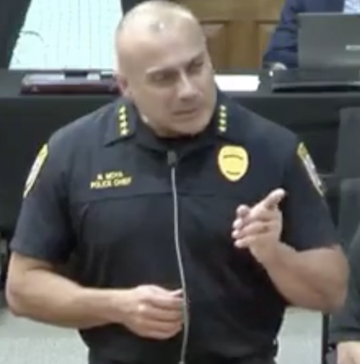
That discussion would have borne a tough decision. A decision that then becomes a policy decision between her office [and] you all in this community. The sad part is we didn't allow for that process to even get to that. And for that, I'm truly, truly sorry. But ultimately, I also am a cop. The responsibility for shooting somebody lies with the shooters that we're pursuing aggressively as we speak. But to the family, ultimately, that means very little because they're at the hospital as we sit here. So moving forward, my commitment is to ensure that our processes are airtight so that a process is what leads the way and not discretion or experience or even institutional knowledge. That should be an element of the process and not the other way around. That is my commitment. I assure you that we've met at length this morning with our fellow directors. They're committed to the same. I'm pretty confident that moving forward, there has to be a balance between providing an opportunity for people to enjoy themselves in public safety with public safety being at the helm. We were prepared for the fallout of the event. We had 15 police officers and then some that we brought to bear because we expected crowds after the fact, particularly at E. University, Wawa, and a couple other places I don't want to mention—businesses—but we were there.
As expected, those crowds came, and we were there to do our very best to keep that crowd moving and keep everybody safe. We were prepared for that. But in hindsight, when you look at the totality of the event at the park, it is the happenings outside of the park that should have brought us to a greater point of decision-making—a critical point of decision-making. Ideally, if you ask me today, notwithstanding what the community may say, because obviously, everybody is very passionate about this. I too would not have approved that process given the totality, but all this in hindsight….
Commissioner Cynthia Chestnut: I think, first, it's a matter of semantics. I think Commissioner Book hit it on the head. No one has an adult Easter egg hunt. The Easter egg hunt was the day before with the children and was done very well. No problems.
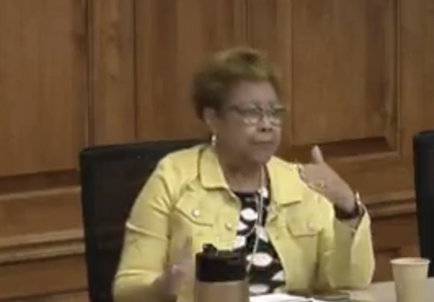
My question to the chief is this, and it's an operational question…. When an event of this nature occurs and it is evident that the crowd has exceeded what it was advertised for, at what point do you call in mutual aid, or is there reciprocity with other law enforcement agencies in town to come to help? Because the crowd needs to be dispersed. Do we have mutual aid with them?
Gainesville Police Department Chief Nelson Moya: We certainly do.
Commissioner Cynthia Chestnut: Sheriff's department? When is—when, at what point? I guess what I'm saying is when you saw that the crowd was at 2,000, it seems to me that that was a point to call in the sheriff or somebody to help disperse that crowd.
Gainesville Police Department Chief Nelson Moya: Yes, ma'am. So I may call up Victoria Young. She's the captain that was working on that day and was out at the event. Again, I'm not challenging any numbers. I don't know that the crowd was 2,000. What I do know is that even towards the event, when the event at the park, right, was seemingly ending, it was the influx of people that happened, as I'm being portrayed, within 15 minutes—the influx of the extra crowd that came into the community—that really caused the problem. In fact, it caused what is perceived to be almost a gridlock situation because people are trying to leave the park. Other people are trying to come into the park, notwithstanding pedestrian traffic. And that's what caused the issue. We, of course, can activate mutual aid anytime we want. In fact, our briefing had just ended, and those resources were brought to bear as well. But by that time, certainly, the crowd is at a greater number. 2,000? Let's assume yes. Yeah. By that time, it's going to take—even with the assistance of our mutual aid partners—some time to move that crowd because you're looking at egress and the availability for cars to move. That becomes problematic, and it takes, at that point, too long of a time, too long of a time.
City Manager Cynthia Curry: If I might intervene, Commissioner Chestnut, to augment the chief's comments, I don't have as many words as he just had. But I can tell you that several years ago, when we were dealing with the situation inside the park, we had mutual support from the Sheriff's Office. We called them in advance. They were not in the park, but they were up and down the street supporting us, because it goes from the internal to the city's boundaries and then into the county. We call them in on the front end for the events.
Commissioner Cynthia Chestnut: I think that is what I'm looking for, Madam Manager. If you are—this went on from 1:00 to 8:00 or whatever? What was the time?
Gainesville Police Department Chief Nelson Moya: It was permitted from 12:00 to 7:00….
Commissioner Cynthia Chestnut: During that period of time, what I'm saying is that there should have been forewarning [to have] the Sheriff's Department ready to come in to help us, but it was quite evident that we were not going to be able to manage this crowd. As you said, you were planning for the afterwards down at University Ave. not at TB McPherson. But I guess, operationally, we need to look at forewarning and preparation beforehand, is what I'm saying.
Gainesville Police Department Chief Nelson Moya: Absolutely. When you look at an event of this magnitude, ma'am, yeah.
City Manager Cynthia Curry: The breakdown here is communications. Because if my office had been involved and I had John Alexander
Commissioner Cynthia Chestnut: He would have known.
City Manager Cynthia Curry: It's not like John is the end-all, be-all, but he's been in the department for 20 years. He's been involved in these events. I mean, from Chief Jones to Chief Scott, a lot of staff out here from GPD. They didn't just come in here yesterday. They have been a part of these events. Historically, we just threw everything out the window and went with brand-new knowledge, I guess.
Commissioner Cynthia Chestnut: I guess so. And just for the record, no more adult Easter egg hunts, please.
Gainesville Police Department Chief Nelson Moya: Yes, ma'am.
Commissioner Desmond Duncan-Walker: I just want to take a couple of moments to make some statements. I heard a couple of my colleagues say a couple of things that I did just want to address. Commissioner Ingle, I thank you so much for your attention to the emotion that exists up here. You're probably right. There's a range that exists up here. But I did want to make sure that I said that a couple of years ago the manager did put forward a policy that was supported by this commission. So while we could go back and relook at something, I don't know what we need to do. It was already there. There was a breakdown in how it was actually implemented. I think that's where the conversation is going to happen from the manager's side of this.
The church down the street from TB is an outstanding—first of all, a faith organization that has always made its parking available....
I spoke with the pastor this morning. He shared with me that they didn't just open up the parking, but they actually opened up the church so that people could come in and be cool. They could get a drink of water. They passed out literature, etc., etc., because that is what, in his words, churches do. Wonderful partner, but the parking situation is still not enough. And let us bear in mind that the old First Missionary Baptist Church that serves as their fellowship hall has, I think he said, five bullets in it right now. Five bullets are in the building from where the shooting took place.
I really wish you could have been at this conversation today, but I know we shifted the agenda so that we could speak about this. I know that he has some thoughts. But I want to share this because I don't think we have ever talked about this event from this perspective.
Peaceful Sundays, the events that happen at TB McPherson, are cultural in nature.
When we have a conversation about where they are, the organizers aren't going to want to go to certain parks because part of the allure is the location being in a particular neighborhood or being around people that they share certain cultural nuances with, cultural similarities with. That I have heard directly from the mouths of organizers. An event like this is very much an experience. It's an experience. It is the car show. It is the music that's loud. It is the hair…. It's an experience, is what I'm saying. Where it is critical, right? So that all of that can safely be done. Folks don't have to agree with the way it's done or what's happening as long as it's safe. If everyone who is participating in the event is safe and the neighborhoods around it are safe.
As we have conversations in the future about the city being able to accommodate that, I think we have to take all of that into consideration because the manager had offered another venue that at one point was turned down.
City Manager Cynthia Curry: There was no shade.
Commissioner Desmond Duncan-Walker: Well, that's right, no shade. But then too, even at that space, the ability to be able to do all of those things is kind of minimized, okay. I think we have to take into consideration what the event is. I want to fast forward now to the conversation on guns because while we may not be able to legislate it, I wonder if we might be able to have checkpoints just like out at Gator games. Don't you walk through checkpoints to see if you have something on you? Maybe that's something that we need to start talking about.
Mayor Harvey Ward: We do that right here [in City Hall].
Commissioner Desmond Duncan-Walker: Thank you, Mr. Mayor, for reminding me. We do that right here. So maybe, when we start having our events—I don't know what the expense would be, but I'm interested in that conversation, what that looks like. Manager Curry, Were you trying to say something?
City Manager Cynthia Curry: Well, that cost would pass on to whoever was using the facility. It wouldn't be our cost.
Commissioner Desmond Duncan-Walker: I think that is something that we need to seriously consider. Where we are headed in terms of our commitment to ending gun violence is still my priority and still very much the priority of this commission. How we do that, how we can continue to make strides to improve that, is key. If you get wanded now and if that becomes a part of our policy when we're doing events, then so be it….
Commissioner Bryan Eastman: I mean, sitting here listening to all this, thinking through the families and the folks that have been injured, one, it's devastating for our community to have to be back here partially because, as we said, we have been through all this before. I remember the first year or so that a lot of the newer commissioners and I sat on the commission, and we were having a lot of conversations about this. Seemingly it is somewhat of a discrete issue where we had folks that were not necessarily from this community that were coming in. It was usually cars. There was alcohol. There were get-togethers that were not necessarily sanctioned by things. I recognize some of this is around Peaceful Sundays and folks meeting outside of there. Some of this we dealt with in our parking garage downtown. We dealt with it with various other sections. It's horrible to be where it felt like we were putting this behind us, and we're now back having these conversations again….
I’m glad to hear GPD is working really hard to find the person that wielded the gun and did this. As they said, at the end of the day, someone decided to pull a gun out at an event and decided to victimize people within our community.

Moving forward with that and also making sure that our policies and processes are balancing this out, we want to make sure folks are able to have the events that they want to have while making sure that everyone feels safe. But Chief Moya, if you could—we had conversations in the past about crowd control. This is something that I know has, for me, continued to come up. You know, there are still events and parties, informal parties that will occur along University Avenue and places like that. That's been, to me, one of the core issues that we have here. I understand I've not been there. I know, talking with GPD officers, it's a very scary situation to be in a crowd like that. Getting those crowds dispersed and making sure they are moving away in a safe way is one of the central parts of how we keep this safe and keep people moving. I don't know if there is. There's got to be some mechanism, some best practices from around the country, something that would make it easier for folks to be moved along so we're not having these.
Gainesville Police Department Chief Nelson Moya: In my tenure here, that has been one thing that has concerned me. The speed at which a lot of these events, these unsanctioned, un-permitted events, happen in our neighborhoods....
They are amassed rapidly. It always puts us in a reactive position to now break the crowd up, such that in the middle of those events on more than a couple of occasions now we have had shootings in the middle of that. Some contact, some not. So the quest for us has been, how do we do this? Because other times when we plan for it in anticipation, it doesn't happen. It's literally that we're dealing with sometimes the unknown, sometimes the known, based on the rhetoric or Facebook posts, and it puts us in preparation mode. With that, it is very difficult for us to bring to bear the number of staff that we would need, even if we activated our mutual aid. When you're talking about hundreds, if not 1,000 people…. That's tough to do. When you are doing it in reaction mode, it makes it even harder.
Outside of me bringing to the table every weekend no less than 30 to 40 police officers, that then puts me in a position to draft—much like we do for the UF games—to force people to come to work. All of it puts me in a predicament. It puts me in a very reactive mode, and none of it makes me very happy. That continues to be an issue, and we deal with that. Hence why we planned for the after-event this past weekend, and we were still inundated….
City Manager Cynthia Curry: Chief, did we have an emergency ops plan for this event this past Sunday?
Gainesville Police Department Chief Nelson Moya: Yes, ma'am, we did.
City Manager Cynthia Curry: Who prepared it?
Gainesville Police Department Chief Nelson Moya: The captains.
City Manager Cynthia Curry: Was [Gainesville Fire Rescue] involved?
Gainesville Police Department Chief Nelson Moya: They prepared their own ops plan. Chief Hillhouse can speak for themselves. There was coordination, but not the amount of coordination that I think would have led to a different decision.
City Manager Cynthia Curry: Which is a part of the planning and the communication and the collaboration that did not happen.
Gainesville Police Department Chief Nelson Moya: Yes. Ideally, if we treated this like a different scale event, those ops plans by the respective parties and respective directors would have been brought to the table, ma'am. At that table we would have discussed our plan and your plan up to the point where we say, "Look, we may not be able to staff this adequately," hence a tough decision.
City Manager Cynthia Curry: So the point that the [application] might have said 400, but history tells us that 400 is 1,000 or 2,000—that never came into play?
Gainesville Police Department Chief Nelson Moya: Beyond what was in the application, no, ma'am.
Chief Moya addresses Manager Curry's questions (City of Gainesville)
Commissioner Bryan Eastman: Thank you, Chief.
Gainesville Police Department Chief Nelson Moya: Yes, sir.
Mayor Harvey Ward: Okay. I don't see any other lights. We have already had public comment on the item. Does anybody up here need any final words on the subject?
Commissioner Ed Book: I'm mindful that we don't make four or five knee-jerk decisions today. You don't do that in response, but you do think about long-term plans and how you improve and move on. I do think there is some process there and some permitting, but that's not the key. The key is operational. How you deal with event management. Just from a standpoint of remarks, [you] probably want to make sure from a city perspective that all our departments really understand event management. That can be training. That can be professional development. That could be coordination. I don't know because I don't have the knowledge of how we're dealing with that now, but that's a critical component, I think, for the staff that you manage, Madam Manager.
On this permitting side, I don't even like the fact that we're talking about the permitting a lot because I don't really think that's the key issue. But it does give us an aspect to always tighten up. I hope the city attorney is thinking along the lines of, are there ways that you take some of these factors that the chief was just talking about? Are there ways to potentially allow us to tighten up the dials when we have problematic history? Are there civil remedies that we take against organizers that don't follow their own rules of engagement? I think we should be looking at those. There should be sanctions and penalties for those who don't follow the rules, and we have enough information to indicate they knew it. Maybe based on history. I know that's a very difficult area, and it's kind of a civil remedy area. Not my area of expertise. But I would hope that the city attorney's office may want to consider something along those lines. I would just hope that our various departments are really spending some time in the communities that were most impacted, the neighborhoods. Not on the crime-solving side, but on the neighborhood communications side over the next two or three weeks. You never know what information we might pick up. I'm guessing this is already. But if not, we're talking about a lot of time really walking door to door and talking to the neighborhoods about how they feel about this particular event at any given time on any given Sunday. I'm certain most will not be in favor of it, but we may pick up additional information that strengthens our partnerships there with them. Those are just some thoughts. We don't need a motion at this point, but just things I’m kind of thinking about….
Mayor Harvey Ward: I want everyone that works for the City of Gainesville, whether you are the manager, in the manager's office, with the Gainesville Police Department, with Parks, Gainesville Fire Rescue, or anyone on our team, we absolutely want to support what you're doing and how you do it as best we possibly can from this commission. We will continue to do that. If you are anyone else in the community watching this right now or on video later, know that there is no lack of concern from this commission and from me. We are absolutely dedicated to getting the problem solved and moving forward. We are a community that enjoys celebrating, and sometimes celebrations bring unintended consequences. We have to find ways to button that up. To the family of those injured and to those injured, as Commissioner Ingle alluded, thoughts and prayers sound hollow, but you have the thoughts and prayers from us, and we will do anything that we possibly can to honor you in the future by making sure this sort of thing doesn't happen again.




